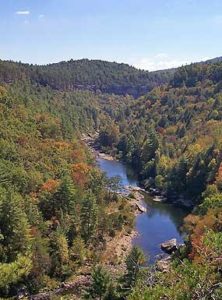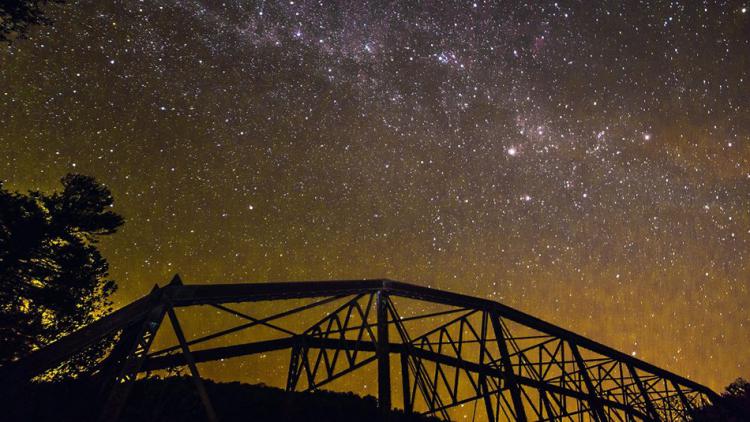
Our river is the Obed River in southeastern Appalachia. There are five of us. We’re all good friends. We work at the same restaurant and watering hole, the old Sunspot, on the old strip – otherwise known as Cumberland Avenue in Knoxville, Tennessee. We are coming of age, living in an Appalachian city, and rambling out-of-doors for leisure and fun along this wild and scenic river on a November afternoon in 2008. Here, the Obed’s waters drain from the Cumberland Plateau. We will hike, camp, and party where Native American tribes – the Creek, Chickasaw, Choctaw, Shawnee, Yuchi, and Cherokee – used to hunt, gather, and find shelter from the elements beneath rose colored sandstone.
Though a chill is in the air, the late autumn sun still provides enough warmth for our comfort. When our star sets, however, the rising moon will preside over a clear, radiant, freezing night. We have no fear. We have good gear and plenty of long johns, sweaters, coats, and hats – not to mention plenty of whisky, wine, and beer – to keep us warm.
We spend the first little bit of our mini-vacation on camp chores. We are all crashing together in a group tent. Jenna, an athletic, adventurous, and strong-willed woman, along with Joe, a long-haired, grizzly bearded, and friendly fellow, get to work on our tent. Mullaly, a bright, cheerful woman, also my Mechanicsville roommate, strategically places lanterns, coolers, cooking supplies, and camp chairs gently about. I embark on a scavenger hunt with Dave, a tall, quiet, introverted fellow. Our mission is to gather a good number of dead leaves, pine needles, kindling, and sticks for a cooking fire. We are also on the hunt for larger felled logs – we will need them for the late-night bonfire.
Dave, like me, is a budding Earth scientist with a heavy interest in ancient environments. Unlike myself, he is shy and reticent. We chat but mostly scavenge and explore quietly. We both find merriment in the woods as we move across Pennsylvanian aged sandstones and shales. Among the quivering trees, these Paleozoic rocks have eroded into impressive, shallow, abri cliff faces. Standing under these rock shelters, we shiver and share a chuckle. Our November air is noticeably cooler in the damp of these carved formations. Looking out, we see huge boulders strewn across the woods. It seems as if they have fallen from cliff faces just to offer us a chance at some recreation. We oblige the invitation to climb, jump, and whoop about.
After some play, Dave and I are back to the task at hand. We are not far at all from camp, so we begin gathering autumnal debris from broad-leaf deciduous trees and needle-leafed evergreens in what feels like our own personal mesic grove. We make several trips with armloads of fuel. We happily labor under a bright blue sky as golden clouds hang low across the horizon. With their chores wrapped up, the rest of the gang joins us in the deep copper colors of late autumn’s mosaic. We stockpile an impressive amount of ammunition for a warm fire.
Our camp looks cozy. Chairs circle the fire-pit; our gear is all readily accessible. The tent is up with our nap pads, sleeping bags, pillows, and blankets all lined up together in a row – except for Dave’s sleeping gear. Since Dave has demonstrated that he’s a private fellow, he sets up his own one-man tent. He’ll slumber with peace and quiet away from us rebel-rousers.
I do mean rebel-rouser, too. We’re here to enjoy the lucid air and scenic river during the day, and to feast, drink, and carouse all night long. Some of us may be loud and crass. Others have seen their bit of trouble a time or two, but we are certainly not fools or brutes. Now, a rabble-rouser, or, what some consider the “official” pronunciation of the term, could be a politician, a pundit, orator, or some variant of the same cloth. A large swath of these firebrands use their bully pulpit effectively – enough to reach political celebrity. As one hand waves, the other ensures our institutions – state, military, corporate, technological – become more dominant, complicated, and obtrusive. Still, liberty lives on.
I decide to relax so I crack open a tall boy and look to the Obed. This is the first chance I get to observe my surroundings. November is my favorite month. Late autumn feels contemplative, comfortable, and even wise. As autumn matures, the bright glory of October trades for the crimson, brown, deep purple, copper colored wisdom of November. The sun casts a long shadow across the Earth. In the bright background, I silently watch November leaves rattle and hum in the whispering ovation of the Obed River. As the sunlight illuminates their deep colors, the leaves appear as phantoms – translucent, as if accepting their senescence. The blue sky, the grey limbs, the rusting colors, the green understory, the brown decay all offer a heart-wrenching beauty.
Behind all of this elemental wonder is the untamed, steadfast Obed. These waters are so powerful they have carved spectacular gorges from sandstone bluffs. We should thank rivers as old and free as this one. Their labors produce the rugged landscapes, wild lands, and moments of pure freedom that are so precious, fundamental, and soul-shaping. The Obed is everything on this trip. Though impetuous and grand in geologic force, the river’s song, ever present, is intensely bright and refreshingly tranquil at the same time. The river moves and eddies. Patches of deeper water run clean, smooth, and appear as shadow-like. Along the banks, clear water exposes sediment and rounded stones, as small ripples shimmer and playfully reflect the sun. Even still, from observation one can note the river’s awesome power. As rapids crash, splash, and roar, they submerge, conquer, and erode boulders.
At home in the world’s largest hardwood-forested plateau, the Obed offers refuge to species of fish, mussels, freshwater crayfish, salamanders, aquatic insects, and many more. Further, mammalian families of whitetail deer, grey fox, raccoons, rabbits, river otters, bobcats, and more drink from and play in the Obed. Topping off this natural realm are often musical, always inspiring, avian communities including numerous species of hawk, wild turkey, the barred owl, great blue heron, fiery crimson cardinal and so on. And this light doesn’t even begin to shine on the vast diversity of micro-flora, the protozoa at home with the river algae, the fungal families at work in the soil, nor the various plant forms. The biodiversity here is fragile, majestic, and as inspiring as the Obed itself.
Sitting here, taking all of this in, I am reminded of a quote from transcendentalist Henry David Thoreau:
There is nothing inorganic . . . The Earth is not a mere fragment of dead history, stratum upon stratum, like the leaves of a book, to be studied by geologists and antiquaries chiefly, but living poetry like the leaves of a tree, which proceed flowers and fruit; not a fossil Earth, but a living Earth.
Now I’m no supporter of the Gaia hypothesis, the idea that the whole Earth is a single organism, but I get Thoreau’s point. We are all just traveling along in space-time. We exist because, and are all built of, the cosmos. In ourselves, the universe found a way to express itself. We enjoy life because of the labor of atoms and molecules. We are inner and outer space. We exist because of our ancestors before us, we carry on our lives, and we are somehow eternal – to live is to die, but to exist in space-time itself.
The sun hangs low. Time to build a fire. Our dinner cooks under headlamp and fire light. As our wood smokes and embers burn bright in the night, we roast meat and root vegetables. Bluegrass from a traveling music box softly joins the background – the fiddles and mandolin play well out here. The wine and whisky provide comfort as the wind bites cold. The Obed whispers.
“Oh, we’re eating well! My belly is so full!” Mulally says.
“Of course we’re eating well. We all work at a restaurant – even if you’re all just a bunch of front-house servers and bartenders,” Dave says, laughing weakly. He is the only one of us out here who works in the kitchen.
“You didn’t even help,” Mullaly quips.
“Why would I help? It’s my night off!” Dave responds.
To accompany our savory meat and salted root vegetables, I have brought a baguette and brie – I’m so fancy, after all. So, I figure some wine would go well with what I consider to be French staples. I pull out a hearty red wine with some nice calligraphy on the front of the bottle.
“Damn. Good wine!” I say, excited about my pick.
“Yeah. Bottle looks nice. Must be French,” Joe says.
He’s pretty matter-of-fact as he tears his teeth into some meat from the bone and chases it with a large gulp of red. He is so matter of fact I do not even bother to look at the bottle and sing my agreement. The two of us spiral into a discussion about how the French make the best wine and this bottle proves it.
Chuckling, Jenna investigates the wine, “This is Spanish wine. It says so right here on the front of the bottle in big, bold letters.”
“Spanish? Damn!” Joe bellows.
The night goes on, jovial, and full of plentiful eating and drinking. We stack our wood and build a bonfire in the woods. The flames flicker and bounce off the surrounding bluffs and plants. The smoke rises, swirls, and puffs to the heavens. The night is beyond brilliant. The air is cold but we do not mind, hell, we barely notice. The sky is crisp and clear. All the heart-stopping glory of the cosmos is above us. In our remote camp, surrounded by gorges and hugged by the Cumberlands, the sky is unobstructed by human civilization. Starry skies across Appalachia, the nation, and the world for that matter, are a vanishing treasure as light pollution washes away the cosmos. There is refuge here – a place where one can contemplate the expanse. Streaking above us is what seems like a million stars. The dust of our Milky Way is alive in the night. We feel the pure exhilaration of a freedom, which, I for one have not felt in far too long. This moment seems eternal – as eternal as the endless abyss pierced with brightly glowing other worlds above us. We have no choice but to go wild. We are madly alive in the night.
With the stars above – all our passions, hopes, and dreams join the river’s ovation across sandstone bluffs. We travel skyward toward the glowing, still eternity. With my friends, among form and color, life and decay, the alteration of matter, I realize this is immortality. This experience is the freedom only nature can provide. For now, among the white-tailed deer, red-tailed hawks, the mussels, crayfish, and the living river, there is no stopping our burning desires. Like the flickering flames of our fire, we are just dancing in the dark.

Beautifully written, Grant! I love the way you describe nature in this beautiful setting!
It is obvious that you are passionate about the beauty of the Appalachians.
We do need to protect this amazing sanctuary for the reasons you expressed so well.
Politicians need to read this to understand the importance of protecting nature!
Pursue you passion and purpose!!
Beautiful.